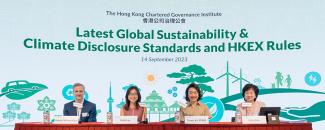
IFRS Sustainability Disclosure Standards – A compelling and urgent case for adoption
CGj reviews a recent Institute seminar that highlighted for companies in Hong Kong the advantages of adopting the new IFRS Sustainability Disclosure Standards launched in June this year.
Highlights
- after years of adapting to a fragmented landscape of competing sustainability standards, companies now have a single, globally recognised framework that will provide the template for sustainabilityrelated disclosures for many years to come
- adopting the ISSB standards will ensure that companies are providing investors with the information they are looking for – in particular, information relating to sustainability-related risks and opportunities in the short and medium term
- to make the standards appropriate for a wide variety of different companies, the ISSB standards have built-in ‘proportionality’ and ‘reliefs’ designed to reduce the cost and effort required to ensure compliance
This year marks a watershed moment in the battle to align global standards in sustainability disclosure. The new IFRS Sustainability Disclosure Standards – S1 General Requirements for Disclosure of Sustainability-related Financial Information and S2 Climate-related Disclosures – were launched in June this year by the International Sustainability Standards Board (ISSB).
The launch of these standards is good news for investors – they are designed to provide a framework for consistent, comparable and high-quality sustainability reporting globally – but they are also good news for companies. After years of adapting to a fragmented landscape of competing standards in this area, companies now have a single, globally recognised framework that will provide the template for sustainability-related disclosures for many years to come.
The standards are voluntary, however, and the extent to which, and the speed with which, they are adopted globally is likely to be partly determined by how far jurisdictions adopt them into their local regulatory regimes. In Hong Kong, regulators have made it clear that they back the standards, although the speed of the local transition to full adoption is still under debate.
In this context, the Institute held a high-profile seminar in September this year in which regulators, practitioners and other stakeholders made a compelling and urgent case for adoption of the ISSB standards by companies in Hong Kong.
Setting the scene
As moderator of the seminar, Edith Shih FCG(CS, CGP) HKFCG(CS, CGP)(PE), Past International President, Honorary Adviser to Council and Institute Past President, and Executive Director and Company Secretary, CK Hutchison Holdings Ltd, set the scene for the discussions. ‘The ISSB standards represent a significant step towards a more sustainable and accountable business world by establishing a common language and consistent reporting framework. They facilitate the aggregation and analysis of data at a global scale,’ she said.
She added that the ESG regime in Hong Kong is already transitioning towards the ISSB framework. It has already adopted aspects of the existing Task Force on Climate-related Financial Disclosures (TCFD) requirements on which the ISSB standards are based. Moreover, the consultation released by Hong Kong Exchanges and Clearing Ltd (HKEX) in April this year – Enhancement of Climate-related Disclosures under the ESG Framework – proposes to enhance climate-related disclosures for listed companies based on IFRS S2.
More importantly, she added that this is not only about compliance – this should be seen as an opportunity for companies to drive positive change, promote responsible business practices and contribute to a more sustainable future for all. She added that governance professionals also have an opportunity to play a key role in facilitating the transition to more sustainable strategies and practices in the organisations they work for.
‘Strong governance can build resilience against climate-related risks and create opportunities for companies. This is where governance professionals come in. As the board’s governance advisers, we help the board to understand corporate accountability and help to establish governance structures for the oversight of the company’s ESG performance,’ she said.
“the ISSB standards represent a significant step towards a more sustainable and accountable business world by establishing a common language and consistent reporting framework”
Teresa Ko
JP BBS FCG HKFCG, Senior Partner,
Hong Kong and China Chairman,
Freshfields Bruckhaus Deringer,
and Co-Vice Chair, IFRS Foundation
A compelling case for early adoption of the ISSB standards
Ms Shih was followed to the podium by Teresa Ko JP BBS FCG HKFCG, Senior Partner, Hong Kong and China Chairman, Freshfields Bruckhaus Deringer, and Co-Vice Chair, IFRS Foundation, who outlined five reasons that companies in Hong Kong should transition their sustainability disclosure practices to the new ISSB standards.
1. Meeting the needs of investors
Adopting the ISSB standards, Ms Ko pointed out, is the fastest way to ensure that investors get the information they need. While sustainability reports have been getting bigger, thicker and glossier, they don’t always contain the information that investors are looking for – in particular, information relating to sustainability-related risks and opportunities in the short and medium term. And, in this regard, Ms Ko emphasised that reporting on opportunities is as important as reporting on risks. Climate change has created a wealth of opportunities, she pointed out, so companies should not focus only on the risks.
2. A global baseline of sustainability disclosure
The ISSB standards offer companies the opportunity to choose a single, globally accepted framework for their sustainability disclosures. The crowded field of sustainability standard setters prior to the creation of the ISSB was adding cost, complexity and risk to both companies and investors. Ms Ko pointed out that the leading sustainability standard setters have now been consolidated within the IFRS Foundation, which set up the ISSB in 2021.
3. Connectivity with financial statements
The ISSB standards are built upon the IFRS accounting standards and integrated reporting principles. Using the standards will therefore mean that companies’ sustainability-related financial information and general financial information will ‘speak to each other’, Ms Ko pointed out. This gives investors, she added, the assurance that they’re getting sustainability information based on the same assumptions, with the same scope and applying the same materiality tests, as financial reporting.
‘This is designed to ensure that there is a coherent and holistic package of financial and sustainability-related information that is delivered to investors,’ Ms Ko said.
4. Proportionality and transition reliefs
The ISSB standards are intended to be used by companies big and small, and they therefore have built-in ‘proportionality’ and ‘reliefs’ designed to reduce the cost and effort required to ensure compliance. The reliefs, in particular, offer a transition period before companies need to be in full compliance with some of the more onerous requirements. Ms Ko explained, for example, that companies can opt not to disclose their Scope 3 greenhouse gas (GHG) emissions (indirect emissions outside Scope 2 emissions that occur in the value chain of the issuer, including both upstream and downstream emissions) for the first annual reporting period after the standards take effect (1 January 2024). Companies who opt to take advantage of this relief, as long as they satisfy all the other requirements under the standards, can still assert themselves to be compliant with the ISSB standards.
5. The standards are informed by rigorous due process
The ISSB standards were developed via a global public consultation process. Ms Ko revealed that, since the exposure drafts of the standards were released in March 2022, the ISSB has received 1,400 sets of comments, and has held 300 meetings, roundtables and other outreach activities involving more than 30,000 stakeholders. Moreover, the International Organization of Securities Commissions (IOSCO), whose membership comprises more than 95% of the world’s securities markets in more than 130 jurisdictions, has independently assessed the standards and publicly endorsed them to be fit for use for financial markets.
“Don’t let perfection be an obstacle to getting started. We should all accelerate our thinking on our strategies, our transition plans and our potential opportunities in the face of climate change.”
Kelly Lee
Senior Vice President,
Policy and Secretariat Services, Listing Division,
Hong Kong Exchanges and Clearing Ltd
Why wait?
Ms Ko stressed the urgency of transitioning to the new ISSB standards. ‘Global institutional investors, lenders and many other stakeholders are looking for material information required by these standards. Don’t let perfection be an obstacle to getting started. We should all accelerate our thinking on our strategies, our transition plans and our potential opportunities in the face of climate change. We need to articulate how we will make progress on each of our sustainability journeys,’ she said.
For listed companies, she also stressed that S1 and S2 are both integral parts of the new standards. ‘You cannot just use S2 without S1, the two work as a pair. You cannot claim to be compliant with the ISSB sustainability standards if you are applying only S2, or only a portion of S1 or S2,’ she said.
The next phase of Hong Kong’s ESG journey
Ms Ko was followed to the podium by Kelly Lee, Senior Vice President, Policy and Secretariat Services, Listing Division, HKEX, who focused her presentation on HKEX’s climate-related consultation proposals.
The consultation proposes to rename the current Appendix 27 of Hong Kong’s Listing Rules from the ESG Reporting Guide to the ESG Reporting Code, and to create a new Part D to the Code, introducing new climate-related disclosure requirements based on the requirements set out in IFRS S2.
‘Our April proposals aim to serve as a springboard or stepping stone to facilitate our listed companies in their transition towards full ISSB adoption in the future,’ she said.
The revised ESG Reporting Code would require, among other things, listed companies to give more granular details relating to their governance frameworks for managing climate-related risks and opportunities. Ms Lee revealed that HKEX received enquiries about the proposal to require listed companies to disclose how the board ensures that the appropriate skills and competencies are available to oversee strategies designed to respond to climate-related risks and opportunities.
She pointed out that HKEX is not mandating companies to appoint individuals with specific expertise. The necessary knowledge and competencies might be acquired, for example, via external consultants and/or training. The focus is more on ensuring that the board assesses whether those responsible for these issues within the organisation are equipped to manage climate risks and opportunities, she explained.
While the consultation proposals are based on IFRS S2, HKEX has taken into account the current readiness and capabilities of local companies, and formulated its proposals accordingly. For example, while IFRS S2 allows a one-year exemption for disclosure of Scope 3 GHG emissions, HKEX is proposing to allow issuers to make ‘interim disclosures’ during a two-year interim period following the effective date of the revised ESG Reporting Code. The interim disclosures should include:
- information, to the extent reasonably available, that may enable investors to understand the issuer’s relevant upstream or downstream activities along the value chain, and
- its work plan, progress and timetable for making the required disclosure.
Ms Lee said HKEX recognises that Scope 3 GHG emissions reporting is not an easy task. Even with the two-year interim period in place, she pointed out that issuers will need to start early with their preparations for full compliance with the Scope 3 reporting requirement.
She added that listed companies need to recognise the urgency of preparing for Hong Kong’s new ESG regime. ‘I would urge you to take immediate action,’ she said. She confirmed that HKEX will publish further guidance designed to help companies transition to the new regime. ‘We are all in this together and HKEX is committed to helping listed issuers and our markets on this journey,’ she said.
“our April proposals aim to serve as a springboard or stepping stone to facilitate our listed companies in their transition towards full ISSB adoption in the future”
Kelly Lee
Senior Vice President,
Policy and Secretariat Services, Listing Division,
Hong Kong Exchanges and Clearing Ltd
The institutional investor perspective
The ISSB standards take an investor-focused approach to sustainability disclosures. Gabriel Wilson-Otto, Head of Sustainable Investing Strategy, Fidelity International, and a panellist at the seminar, was able to give the institutional investor perspective on the issues under discussion.
In tandem with the increasing attention focused on climate and other environmental and social issues, interest in sustainable finance and sustainable investing has also grown rapidly over the last couple of decades, Mr Wilson-Otto pointed out.
He pointed to several trends that have contributed to the rise in sustainable investing, including an increased focus on directing capital towards companies that contribute to positive environmental or social profiles and increasing recognition that integration of ESG considerations into a fundamental investment processes can help price risks and opportunities more appropriately.
The fact that so many of the long-term risks that companies are worried about are ESG-related, highlights the fact that this is ‘moving into the mainstream’ and becoming part of traditional strategic planning, he said.
‘Over US$30 trillion worth of assets globally are now marketed as sustainable, up from around US$12 trillion a decade ago. A key challenge is that to date, there is no single global definition of “sustainable”. This has created significant challenges because in the absence of a consistent definition, it can be challenging for investors to evaluate the authenticity of investments products marketed as sustainable,’ he said.
This is why the launch of the ISSB standards is so significant for institutional investors, he added. ‘The standards will provide a critical baseline of qualitative and quantitative information that will help us differentiate between companies that are performing well on material ESG issues, price associated risks and opportunities, and contribute to increased transparency for investment products,’ he said.
The seminar reviewed in this article – Latest Global Sustainability & Climate Disclosure Standards and HKEX Rules – was held on 14 September 2023.
“the [ISSB] standards will provide a critical baseline of qualitative and quantitative information that will help us differentiate between companies that are performing well on material ESG issues, price associated risks and opportunities”
Gabriel Wilson-Otto
Head of Sustainable Investing Strategy, Fidelity International


